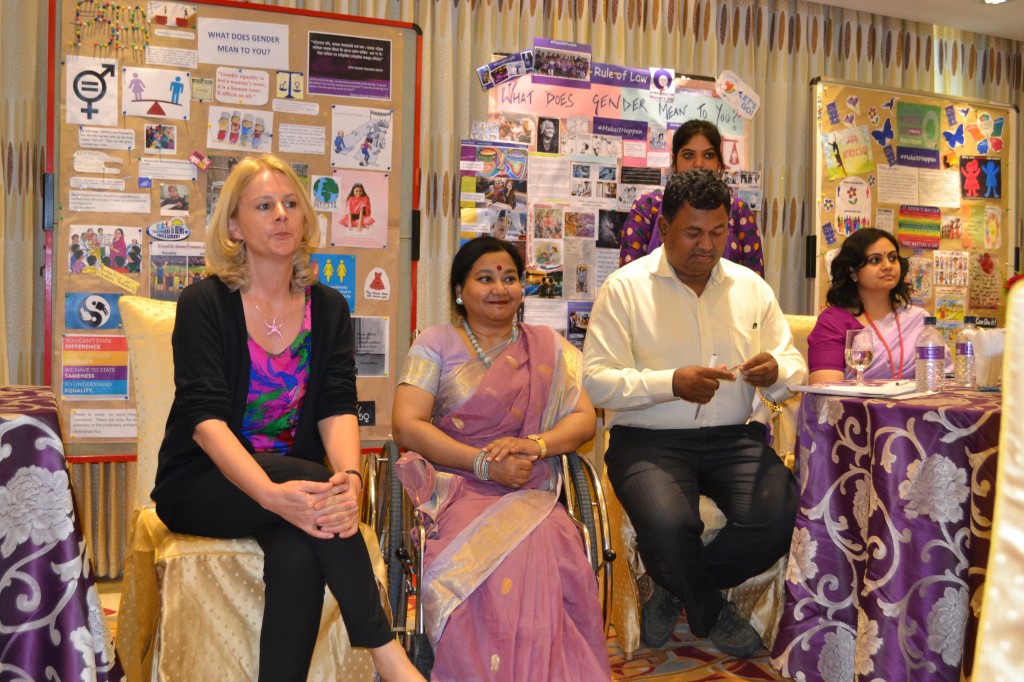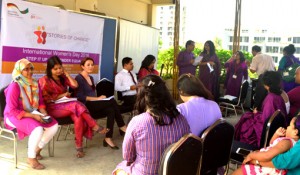Event Documentation:
“Gender equality starts at home! – that is one of the five strategic elements in the framework of the GIZ Gender Strategy. Gender equality within the company – what does it mean to us? On International Women’s Day, let us take a look at the scenario in GIZ Bangladesh. We have 274 national personnel (NP), only 30 per cent of whom are women. According to the Gender Strategy, this figure should be at least 50 per cent. At the managerial level, there are 43 NPs – but only 11 (25 per cent) are women. One silver lining is that we pay the same monthly basic salary to both men and women. Although for support staff, we pay 22 per cent less to women for the same job. The good news is that we are doing something to address this issue. When we recruit and promote our staff, we should first look internally. We should empower and support the capacity building of female staff members so that they can be on equal footing with their male counterparts. We should also look at the success stories shared today and learn from them.” With these inspiring words, Gohar Minasyan-Oehrlein, Director of Administration at GIZ Bangladesh launched a discussion session to celebrate International Women’s Day. Titled “Stories of Change,” the session was organised by the GIZ Bangladesh Gender Working Group on 8 March 2016.
To set the tone for the afternoon, Bubli Kundu from GIZ’s partner organisation Bangladesh Legal Aid and Services Trust (BLAST), performed a song by national poet Kazi Nazrul Islam, calling for women to rise to their rightful place. GIZ’s Josephine Gain then called for friendship among men and women through her song.
Then Bubli, who is a paralegal, and Md Khairul Islam, Rehabilitation Supervisor at RDRS Bangladesh (another GIZ partner) shared Parul’s story. The case study was one of the top 20 entries at the GIZ Gender Competition 2016.
When Bulbli and Khairul met Parul, she was serving a sentence in Rangpur jail for 12 years. Although she was eligible to be released, she did not have any money to pay the BDT 5,000 (EUR 60) court fee. Other prisoners, prison officials and paralegals contributed the money and secured her release. Bulbli and Khairul referred her to a shelter where she received vocational training. They also reunited Parul with her husband (who has visual impairment) and the daughter who had accompanied her to jail as an infant but was later placed in another shelter. When she left the shelter, Parul was given a sewing machine. She now earns BDT 2,000-3,000 (EUR 24-36) per month and supports her family. Her dream is to open her own shop one day.
Nahida Sultana from GIZ then shared the story of midwives, who are making deliveries safer for mothers and new-born babies in Sylhet, Rajshahi and Narayanganj.
Lastly, GIZ’s Nazmun Nahar presented the case of solar powered drinking water systems, which are providing more than 60,000 households in southwestern Bangladesh with safe drinking water near their homes. As a result, women with children no longer have to travel 4-5 hours per day to collect safe drinking water from distant sources. Instead, the time is used for income-generating activities and education. The use of safe drinking water is also reducing illness and disease, especially among children and pregnant women. Female water dispenser managers also have a new source of income, leading to social recognition and economic empowerment.
In her closing remarks, Mehzabin Ahmed, the Chair of GIZ Bangladesh’s Gender Working Group summarised, “Looking at the previous story from Nazmun, we see that the urban and rural women have one thing in common – time poverty. The urban woman spends time not only at the workplace but also for family and community work. Let us pledge to find a balance. Happy Women’s Day everyone!”
Photo Gallery of the Event:
—————————————————————————–
When: 8th of March 2016, 3:00 pm to 4:30 pm (GMT +6)
Where: GIZ Office, Dhaka, Bangladesh
With: Sharing of stories of change and best practices from projects and entrants of this year’s Gender Competition with all GIZ Bangladesh colleagues.
What: This year’s International Women’s Day is observed at GIZ Bangladesh with the theme “Stories of Change” – celebrating acts of courage and determination by women in their communities – looking at best practices and the impact of our everyday work on gender equality.

Speakers at event celebrating International Women’s Day 2015 at GIZ Bangladesh with the theme – “Including Us”

 GIZ Gender Website
GIZ Gender Website




